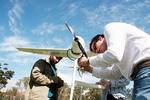Our eye in the sky aims to save lives
 Engineering Engineering
Shark attacks could be a thing of the past at Adelaide beaches thanks to the efforts of a group of final-year engineering students at the University of Adelaide. Eight students from the School of Mechanical Engineering have designed and built an Unmanned Aerial Vehicle (UAV) with a range of applications including shark patrols, bushwalker rescue, aerial mapping and traffic monitoring. The seven-month project, involving four Aerospace and four Mechatronic Engineering students, has resulted in a plane that can fly without human interaction and stream live video footage from a 10km radius. The project is a landmark achievement for the first cohort of students completing their Bachelor of Aerospace Engineering undergraduate degree in 2007. Team member Jonathan Bannister said the plane was configured primarily for search and rescue and was designed to fly for one hour with a cruising speed of 90km/h. It will be put through its paces at an international UAV competition being held in Queensland on September 25 and 26, involving 35 teams from six countries. "Building this plane has been an incredible challenge for us," Jonathan said. "It has incorporated so many different aspects of engineering, from design through to construction, testing and operation. "The workload has been huge but we have learnt so much about aircraft design, about manufacturing, about computers and communication equipment. It's real aerospace knowledge that we can apply in the real world when we graduate." The September competition, organised by the Australian Research Centre for Aerospace Automation, offers a $40,000 incentive. The prize money will be awarded to the entrant whose plane finds a lost bushwalker in the Queensland outback in the shortest time. Thanks to $50,000 from The Sir Ross and Sir Keith Smith Fund, aerospace company Thales, the School of Mechanical Engineering and other local companies, the students have built what they believe is an outstanding aircraft. "This plane will have a lot of commercial applications," Jonathan said. "The primary one is shark patrol and surf lifesaving surveillance. "At the moment we have fully manned aircraft flying up and down the South Australian coastline, which costs around $1200 a day. If you were making a few of these UAVs you could sell them for less than $10,000. "They can be launched off a beach, recovered by parachute and can also land in the water. Surf lifesavers could have a computer monitor with them and track video footage from the plane at any time," he said. The UAVs could also revolutionise the way surveyors work on large acreage, replacing theodolites and GPS (Global Positioning Systems) equipment with laser levels scanned from the aircraft. "Other uses include bushfire management and traffic surveillance, as well as locating lost bushwalkers as per the competition," Jonathan said. With a wing span of two metres and a weight of approximately nine kilograms, the UAV is constructed of composite materials and can land vertically via a parachute system, which averts the need for a runway. "Flight testing is expected to begin shortly," Jonathan said. "We are really looking forward to seeing the aircraft fly. After so many hours of work from all team members it will be very rewarding to get some positive results." For more information on this project please contact Jonathan Bannister at jonathon.bannister@student.adelaide.edu.au Story by Candy Gibson
|




